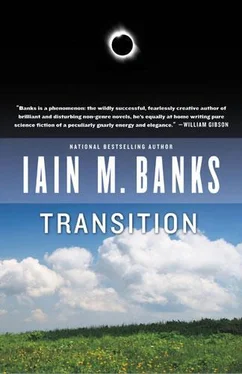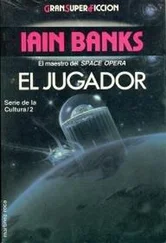Madame d’Ortolan – immaculately dressed in a cream twin-set, an unlined notebook to the olive graph-paper of Professore Loscelles’s bucolic three-piece – gave every appearance of thinking fairly seriously about trying to cram the Professore through the unfeasibly narrow window of the tiny study space and out to the sixty-metre drop below. “Loscelles,” she said, with an icy clarity, “have you gone completely insane?” (Professore Loscelles flexed his eyebrows, perhaps to signal that, as far as he was aware, he had not.) “If people,” Madame d’Ortolan said slowly, as though to a young child, “are able to transition without the drug… how are we to control them?”
“Well-” the Professore began.
“First of all,” Madame d’Ortolan said briskly, “this has not turned up in one of our extremely expensive but – now, apparently – rather irrelevant laboratories, or within the context of a carefully regulated field trial, or constrained by any sort of controlled environment; this has come upon us on the hoof, in the midst of a profound crisis in the Council, and in the guise of a previously loyal but now suddenly renegade assassin who, I am nervously informed by those trying and mostly failing to track him, may be continuing to develop other heretofore undreamt-of powers and worryingly unique abilities in addition to this one. As though-”
“Really? But that’s extraordinary!” the Professore exclaimed, seemingly quite excited by such a development.
The lady’s brows knitted. “Well, fascinating !” she shouted, and slammed her palm on the carrel’s small desk, raising dust. The Professore jumped. Madame d’Ortolan collected herself. “I’m sure,” she continued, breathing hard, “you’ll be glad to know that the relevant scientists, experts and Facultarians all share both your enthusiasm and your inability to appreciate what a catastrophe this represents for us.” She put her hands on either side of the Professore’s ample cheeks and brought them towards each other so as to compress his smooth, perfumed flesh, making it look as though his squashed mouth and ruddily bulbous nose had been jammed between two glisteningly plump pink cushions.
“Loscelles, think! Defeating an individual or grouping of people is easy; one simply brings greater numbers to bear. If they have clubs, and so do we, then we simply ensure that our clubs are always bigger and more numerous than theirs. The same with guns, or symbols, or bombs, or any other weapons or abilities. But if this man – who is now patently not one of us, whose hand, rather, is most forcibly turned against us – can do something that none of our own people can do, how do we combat that?”
The unyielding firmness of her grip on his face and the concomitant unlikelihood of him being able to form a comprehensible reply led the Professore to believe that this was in the nature of a rhetorical question. She shook his face gently back and forwards in her hands. “We could be in terrible, terrible trouble, thanks just to the threat of this one individual.” She jiggled his face in her hands. “And, then – worse, for this can get much worse – what if anybody can do this, just with some training? What if any idiot, any zealot, any enthusiast, any revolutionary, dissident or revisionist can just decide they want to flit into another person’s body, displacing their mind? Without planning? Without the necessary safeguards and respect for just cause and proven importance? Without the guidance and experience of the Concern? Where does that leave us then? Hmm? I’ll tell you: powerless to control what is arguably the single most potent ability an individual can possess in this or any other world. Can we allow that? Can we countenance that? Can we indulge that?” She spread her hands slowly, letting go of Loscelles’s cheeks. The Professore’s features rearranged themselves into their accustomed alignments. He looked surprised and a little shocked to have been handled so.
Madame d’Ortolan was shaking her head slowly, her expression sorrowful and grave. Professore Loscelles found his own head shaking in time with hers, as though in sympathy.
“Indeed,” the lady told him, “we cannot.”
“It might, I suppose, lead to anarchy,” the Professore said profoundly, frowning somewhere towards the floor.
“My dear Professore,” Madame d’Ortolan said, sighing, “we might greet anarchy with an open door, garland its brows, hand it all the keys and skip away whistling with nary a care in our heads, compared to what this might lead to, trust me.”
Loscelles sighed. “What do you think we might do, then?”
“Use all our weapons,” she told him bluntly. “He wields a new kind of club; well, we have some unusual clubs of our own.” The lady glanced to the window. “I can think of one in particular.” She watched clouds drift past in a silver-grey sky before turning back to the Professore’s frown. “We have been too cautious, I believe,” she told him. “It may even be to the good that something’s forced our hand at last. Left to ourselves we might have hesitated for ever.” She smiled suddenly at him. “Gloves off, claws out.”
The Professore’s frown deepened. “This will be one of your special projects, I take it?”
“Indeed.” Madame d’Ortolan’s smile went wide. She put one hand out to his face again – he flinched, almost imperceptibly, but she only smoothed and patted his right cheek, affectionate as though he were a treasured cat. “And I know you will support me in this, won’t you?”
“Would it prevent you if I did not?”
“It would prevent my adoring respect for you continuing, Professore,” she said, with a tinkling laugh in her voice that found no echo in her expression.
Loscelles looked her in the eyes. “Well then, ma’am,” he said softly, “I could not allow that. It might serve to put me with Obliq, and Plyte, and Krijk, and the rest. There have been… narrow squeaks reported; abnormal events.”
Madame d’Ortolan nodded, her expression a picture of concern. “ Haven’t there?” She tutted. “We should all be very careful.”
Loscelles smiled wanly. “I believe I am being.”
She smiled radiantly at him. “Why, I believe you are too!”
The Transitionary
“What is it that we do? What are we for and what are we against? What are we for?”
“This again? I have a feeling that if I say what anybody else in the Concern would expect me to say, you’re going to tell me I’m wrong.”
“Give it a go.”
“We help societies across the many worlds, aiding and advancing positive, progressive forces and confounding and disabling negative, regressive ones.”
“To what end?”
He shrugged. “General philanthropy. It’s nice to be nice.”
They sat in a hot tub looking out across a polished granite floor towards a starlit sea of cloud. She scooped a handful of the warm water and bubbles and let it fall over her left shoulder and upper breast, then repeated the action for her right side. Tem watched the bubbles slide. Mrs Mulverhill, even here, wore a tiny white hat like piled snow, and a spotted white veil. She said, “How do we define the different forces?”
“The bad guys tend to enjoy killing people, preferably in large numbers. The good guys – and girls – don’t; they get a buzz when infant mortality rates go down and life expectancy goes up. The bad guys like to tell people what to do, the good guys are happy to encourage people to make up their own minds. The bad guys like to keep the riches and the power to themselves and their cronies, the good guys want the money and power spread evenly, subject to the making-up-your-own-minds thing.”
In this world, there had once been an Emperor of the World. He had caused this palace to be built, levelling the top of the mountain that was variously called Sagarmatha, Chomolungma, Peak XV or Mount Everest (or Victoria or Alexander or Ghandi or Mao, or many, many other names). The palace was vast, enclosed by great glass domes which were pressurised and warmed to mimic the conditions of a tropical island. Now, though, after a catastrophe caused by a gamma-ray burster happening relatively nearby by cosmic standards, the world was devoid of humans or almost any other living thing, and was in the slow, eons-long process of changing profoundly as all the processes associated with life, including carbon capture and even most of its plate tectonics, started to shut down.
Читать дальше












